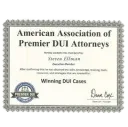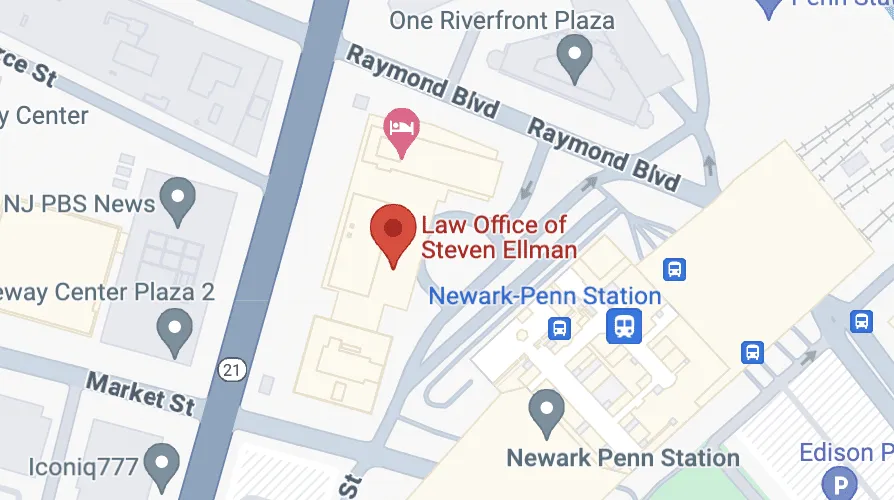

After an arrest for drunk driving, the arresting officer may ask you to submit to a breathalyzer test, which involves blowing into a machine that can detect alcohol on your breath and calculate your blood alcohol content (BAC). The breath test results can confirm whether your blood alcohol concentration was over the legal limit and whether you were driving under the influence of alcohol.
New Jersey’s implied consent laws require DUI arrestees to submit to chemical testing if requested. However, a driver can refuse the test. A
breath test refusal can carry harsh penalties on top of any sentence for a conviction for DWI or other offenses.
If the police have charged you with breath test refusal, you need experienced legal representation to help you understand your legal options and protect your rights. Contact the Law Office of Steven Ellman for a free case evaluation with a breath test refusal attorney. We can explain how our law firm can help you deal with the charges.
When a police officer pulls you over in New Jersey, you should stop your car in a safe place, turn off the engine, and put your hands on the steering wheel. Upon request, show the officer your driver’s license, registration, and proof of insurance.
You have specific constitutional rights, such as the right to remain silent. If you wish to invoke that right, say so loudly and clearly. If you are not under arrest, you have the right to leave.
However, if a law enforcement officer has probable cause to believe that you are driving under the influence of alcohol, the officer can arrest you on suspicion of DWI. After the police arrest you and take you to the police station, they will likely request that you submit to a breath or blood test.
Under New Jersey’s implied consent law, everyone who operates a motor vehicle on the state’s roads consents to a breath, urine, or blood test when requested by a police officer with probable cause. Those who refuse will have their driver’s license suspended.
Police officers cannot forcibly take a breath, urine, or blood sample from a person without a search warrant or another court order. However, a driver who refuses to submit to testing after a DWI arrest may face a breath test refusal charge on top of a DWI charge.
Keep in mind that the prosecutor’s office does not need breath test results to obtain a conviction. Prosecutors can rely on other evidence of a driver’s intoxication, such as police officer observations or witness testimony about the driver’s appearance or behavior.
You might have a viable defense against a breath test refusal charge under certain circumstances. Potential defenses to a breath test refusal charge include:
A knowledgeable DUI defense attorney can evaluate whether your constitutional rights were violated at any point. If so, your lawyer can build a defense based on the evidence.
Although there are limited defenses to refusing a breathalyzer test, you should have an experienced defense attorney to represent you. A knowledgeable breath test refusal lawyer can investigate the traffic stop and the events leading up to the officer’s request for you to submit to a breath test.
If you are convicted of refusing a breathalyzer test, your attorney can negotiate with the prosecution for reduced penalties and avoid more severe penalties. For first-time breath test refusal convictions, the court may have some sentencing discretion. Based on the specific facts of the case, attorney Steven Ellman can argue for a lower fine, a shorter driver’s license suspension, or having the suspension run concurrently with any license suspension you receive for a DUI conviction.
An experienced breath test refusal attorney at the Law Office of Steven Ellman can review the facts of your case, advocate for your rights, and aggressively defend you against the most serious consequences of breathalyzer refusal.
Because N.J. law requires drivers to submit to a breathalyzer test upon request following a DUI arrest, motorists who refuse the test may face penalties, including:
However, penalties for breathalyzer test refusal increase if a driver has a prior conviction is convicted of DUI in a New Jersey school zone:
If you refuse to submit to a breathalyzer test following an arrest for drunk driving in Northern, Central, and Southern New Jersey, you need a knowledgeable breath test refusal attorney to protect your rights, reputation, and future. Attorney Steven Ellman has more than 39 years of experience handling DUI-related charges. He is committed to helping you seek the most positive outcome of your case possible under N.J. law. Contact the Law Office of Steven Ellman today for a free consultation.
















| Monday | Open 24 hours |
| Tuesday | Open 24 hours |
| Wednesday | Open 24 hours |
| Thursday | Open 24 hours |
| Friday | Open 24 hours |
| Saturday | Open 24 hours |
| Sunday | Open 24 hours |

| Monday | Open 24 hours |
| Tuesday | Open 24 hours |
| Wednesday | Open 24 hours |
| Thursday | Open 24 hours |
| Friday | Open 24 hours |
| Saturday | Open 24 hours |
| Sunday | Open 24 hours |

| Monday | Open 24 hours |
| Tuesday | Open 24 hours |
| Wednesday | Open 24 hours |
| Thursday | Open 24 hours |
| Friday | Open 24 hours |

© 2024 All Rights Reserved. The Law Office of Steven Ellman